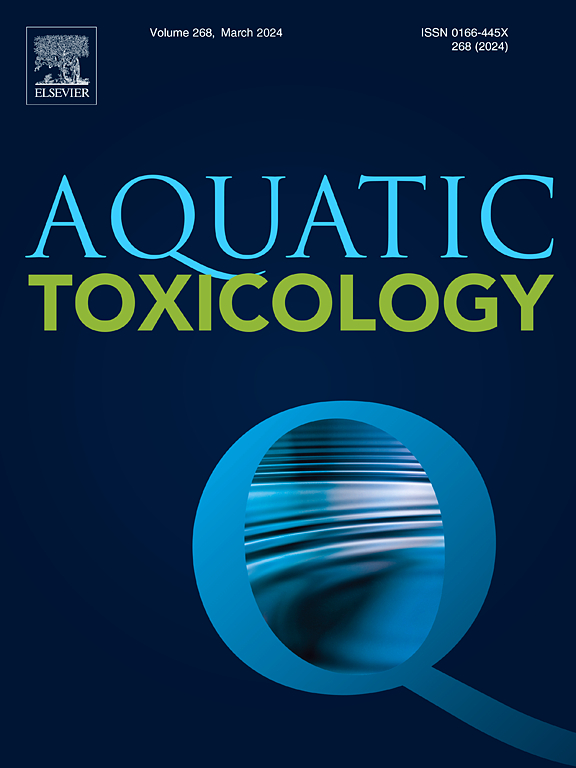氧化锌纳米颗粒在斑马鱼幼体中的分子对接分析和体内毒性评估。
IF 4.1
2区 环境科学与生态学
Q1 MARINE & FRESHWATER BIOLOGY
引用次数: 0
摘要
氧化锌纳米粒子(ZnO-NPs)被广泛应用于多个行业和消费品中,其对水生生物群和人类健康的安全性引起了人们的关注。本研究旨在通过体内和硅学相结合的方法,研究氧化锌纳米粒子可能产生的毒理效应。研究人员将斑马鱼胚胎暴露于几种浓度的 ZnO-NPs 中,并对其形态变化和脂质过氧化反应(MDA)进行了调查。此外,还应用分子对接模拟研究了 ZnO-NPs 与重要胚胎蛋白(即斑马鱼孵化酶 1(ZHE1)和超氧化物歧化酶(SOD1))的分子间相互作用。用 ZnO-NPs 处理会导致 MDA 浓度增加和抗氧化酶水平下降。除了 ROS 解毒基因关键酶的 mRNA 表达量明显下降外,还观察到炎症基因的调节作用,tnf-α 下调较低,il-1β 上调较高。对接研究表明,斑马鱼胚胎的孵化延迟和细胞氧化应激增加可能是通过一种基于 ZnO-NP 依赖性抑制 ZHE1 和 SOD1 酶的协同机制发生的。将体内评估与硅学计算模型相结合,可以更全面地评估纳米材料暴露对斑马鱼胚胎造成的潜在生理风险。本文章由计算机程序翻译,如有差异,请以英文原文为准。
Molecular docking analysis and in vivo assessment of zinc oxide nanoparticle toxicity in zebrafish larvae
The zinc oxide nanoparticles (ZnO-NPs) being widely employed in several industries and consumer products, are raising concerns about their safety on aquatic biota and human health. This study aims to investigate the possible toxicological effects of ZnO-NPs through a combined in vivo and in silico approach. Zebrafish embryos were exposed to several ZnO-NPs concentrations and morphological alterations and lipid peroxidation (MDA) were investigated. Furthermore, molecular docking simulations were applied to study the intermolecular interactions of ZnO-NPs against critical embryonic proteins namely zebrafish hatching enzyme1 (ZHE1) as well as the superoxide dismutase (SOD1). Treatment with ZnO-NPs resulted in an increase in MDA concentration and a decrease in antioxidant enzyme levels. Besides a significant decrease in mRNA expression of key enzymes of ROS detoxification genes, a modulation of inflammatory genes with a low downregulation of tnf-α, and an upregulation of il-1β were observed. Docking study suggests that the delayed hatching and increased cellular oxidative stress in zebrafish embryos may occur through a synergistic mechanism based on the ZnO-NP—dependent inhibition of ZHE1 and SOD1 enzymes. The integration of in vivo assessments with in silico computational modeling provided a more comprehensive evaluation of potential physiological risks in zebrafish embryos associated with nanomaterial exposure.
求助全文
通过发布文献求助,成功后即可免费获取论文全文。
去求助
来源期刊

Aquatic Toxicology
环境科学-毒理学
CiteScore
7.10
自引率
4.40%
发文量
250
审稿时长
56 days
期刊介绍:
Aquatic Toxicology publishes significant contributions that increase the understanding of the impact of harmful substances (including natural and synthetic chemicals) on aquatic organisms and ecosystems.
Aquatic Toxicology considers both laboratory and field studies with a focus on marine/ freshwater environments. We strive to attract high quality original scientific papers, critical reviews and expert opinion papers in the following areas: Effects of harmful substances on molecular, cellular, sub-organismal, organismal, population, community, and ecosystem level; Toxic Mechanisms; Genetic disturbances, transgenerational effects, behavioral and adaptive responses; Impacts of harmful substances on structure, function of and services provided by aquatic ecosystems; Mixture toxicity assessment; Statistical approaches to predict exposure to and hazards of contaminants
The journal also considers manuscripts in other areas, such as the development of innovative concepts, approaches, and methodologies, which promote the wider application of toxicological datasets to the protection of aquatic environments and inform ecological risk assessments and decision making by relevant authorities.
 求助内容:
求助内容: 应助结果提醒方式:
应助结果提醒方式:


